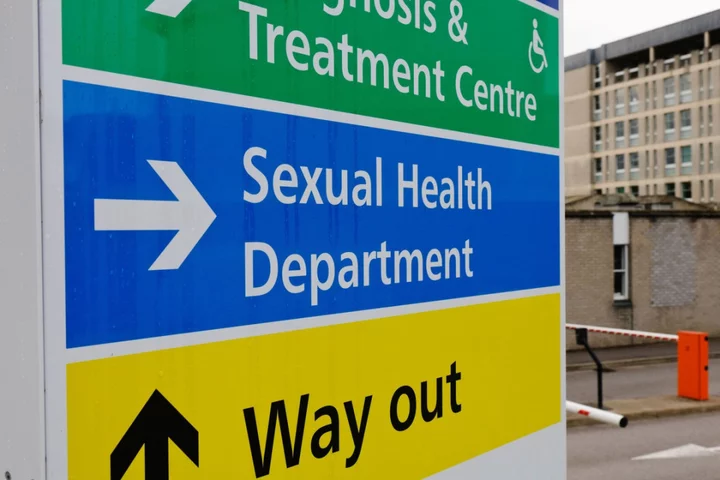
14 best movies of 2023, and where to watch them
Whether in cinemas or on streaming, movies have give us a lot to thrill and
2023-06-14 21:17

4 things you need to know about Juneteenth, the federal holiday
Just days before its 156th anniversary, President Joe Biden signed a bill making Juneteenth, which
2023-06-14 19:21

15 Incredible Books by Stonewall Book Award Winners
The Stonewall Book Award celebrates LGBTQ+ literature and includes standouts from authors like Alison Bechdel, Rivers Solomon, and Michael Cunningham.
2023-06-14 07:24

8 Granular Facts About Sand
Every summer at the beach, sand becomes an essential ingredient in the recipe for fun. But what the heck is it?
2023-06-14 00:25

7 hay fever hacks to ease your symptoms this summer
According to health officials, people sought advice for hay fever symptoms once every three seconds on Sunday. And today, the Met Office predicted the pollen count would be “very high” in most of England and Wales.Hay fever is usually at its worst between March and September – and right now, thousands of people affected are desperate for a solution to their pollen-induced runny noses, itchy eyes and tickly coughs, and other irritating symptoms. The hay fever pages on the NHS.uk website reportedly received 122,650 visits last week alone. So, what can you do to help with hay fever symptoms? 1. Don’t rub your eyes “Red, itchy, swollen eyes are often a real problem for hay fever sufferers,” explained pharmacist Sid Dajani, from Golden Eye Eye Care. “As tempting as it is, don’t rub your eyes. Clean them free of pollen frequently, with cotton lint and cold water, and treat the symptoms immediately with eye drops or eye ointment containing propamidine isetionate.”2. Don sunnies and keep your clothes cleanReducing your exposure to pollen, however possible, can really help. Dajani added: “Wear wrap-around sunglasses to protect your eyes when outside, and have a shower when you get in from work and put your clothes straight in the wash to help remove all pollen. It’s also best to avoid drying clothes outside.”3. Think about your diet What you eat may have an impact too. GP Dr Nisa Aslam suggested: “Stick to an anti-inflammatory diet, with plenty of fruit and vegetables, beans, grains and oily fish, whilst limiting processed food high in fat, sugar and salt. Look for anti-inflammatory, antioxidant herbs, like chamomile, ginger, nettle and turmeric. These can be consumed in the form of supplements or beverages.”4. Protect your nostrilsDr Adam Fox, allergist and advisor to Clarityn, said: “Pollen balms such as petroleum jelly rubbed around the rim of the nostrils can help trap pollen before it enters the nose, and salt water nasal sprays help rinse pollen particles out of the nose, preventing them from sitting in there and causing more symptoms.”5. Keep the windows shut As tempting as it may be to fling windows open at this time of year, Dijani said: “Keep windows, including car windows, and doors shut. Venture out as little as possible. Towns and cities are no more friendly to hay fever sufferers than the countryside, due in part to more extensive ‘greening’ of urban areas.” 6. Prepare for the pollen count Checking to see when the pollen is particularly high can help you prepare. “If you know you have symptoms every year, then it makes sense to be prepared in advance,” said Fox. “If you require a nasal spray, then starting to use it before the season starts will make it much more effective. For adults, these can be brought over the counter, whilst children will need a prescription.” 7. Stay in when the count is really high And if symptoms are still really getting to you? “Avoid going outside when the pollen count is at its highest – in the middle of the morning or the early evening,” said Dajani.
2023-06-13 20:52

7 Facts About Lorraine Hansberry
By the age of 34, Lorraine Hansberry was already the author of two plays that had appeared on Broadway. She should have been on course for a long and successful career—but tragically, that wouldn't happen. Still, her legacy has endured.
2023-06-13 20:23

A Greenwashing Lawsuit Against Delta Aims to Set a Precedent
As tranquil instrumental music plays over gauzy images of nature, a woman’s voice-over begins. “Isn’t it a paradox,”
2023-06-13 19:45

Myanmar junta suspends aid access to a million people in state devastated by Cyclone Mocha
Myanmar's ruling junta has suspended humanitarian access to western Rakhine state, where more than a million vulnerable people are in urgent need of aid a month after a powerful cyclone devastated the region, the United Nations said.
2023-06-13 14:49

15 best mini-series on Max
The couch is calling, inviting you in for a good long binge-watch. You crave a
2023-06-13 04:45

Cruise Stocks Climb as Wall Street Sees Strong Booking Demand
A trio of cruise-line operators jumped on Monday as analysts at Bank of America Corp. and JPMorgan Chase
2023-06-13 02:45

Omega says ex-employees responsible for $3 million fake Speedmaster watch
Swiss luxury watchmaker Omega says it has been the victim of "organized criminal activity," alleging three of its former staff members admitted working with intermediaries to sell a fake Speedmaster watch for some $3.4 million dollars.
2023-06-12 20:58

STI cases at record highs: 6 things everyone needs to know about sexually transmitted infections
Cases of gonorrhoea in England have reached record highs, while syphilis cases are at the highest level since just after the Second World War, according to the UK Health Security Agency (UKHSA). Gonorrhoea diagnoses rose to 82,592 in 2022, an increase of 50.3% compared to 2021, while infectious syphilis cases increased to 8,692 in 2022, the largest annual number since 1948. As well as gonorrhoea and syphilis, it’s important to be aware of the risk around all sexually transmitted infections (STIs) including chlamydia, genital herpes, genital warts and HIV. As Dr Hamish Mohammed, consultant epidemiologist at UKHSA, pointed out: “STIs aren’t just an inconvenience – they can have a major impact on your health and that of any sexual partners.” Here, sexual health experts talk through what you need to know about STI prevention, testing and treatment… 1. Anyone can potentially get an STI “Don’t think that because you haven’t caught one in the past – or because you only sleep with people that you don’t think have STIs – that you are immune, because the truth is that no one is,” Sarah Mulindwa, a specialist sexual health nurse who is working with Lovehoney, told PA Media. Regardless of gender, sexual orientation, whether you have lots of partners or you’re in a monogamous relationship, anyone can potentially get an STI. And they affect all age groups, too. “There’s no upper age limit on getting an STI,” Julie Bowring, consultant gynaecologist in sexual and reproductive health at London Gynaecology, added. The number of common STIs caught among the over 65s in the UK increased by 20% from 2017 to 2019, according to the Local Government Association. This may in part be due to differences in health awareness. “When that generation of patients were at school, they didn’t get quite as good and comprehensive sexual health education as we get now,” Bowring said. “And if you look at all the media campaigns for sexual health infections, it’s usually targeted at a younger demographic.” 2. Not all contraceptives protect against all STIs “It’s a common myth that when you’re on regular contraception, you might have protection against STIs,” said Bowring. “I think that can sometimes be missing in information that’s given to patients when they start contraception.” While birth control methods such as the pill, coil or IUD will protect against unintended pregnancy, they won’t protect against STIs. “Condoms [or dental dams] are the only effective method of protecting against STIs if you are sexually active,” said Mulindwa. “And even then, only when you use them correctly: wearing one to cover the whole length of the penis, and using from start to finish of sex, including during oral, anal, or vaginal penetration.” 3. Symptoms can vary greatly With a wide range of symptoms that vary in severity, STIs can sometimes be difficult to spot. “Certain STIs, such as chlamydia for example, might not even present any symptoms in the person that has it,” Mulindwa explained. “If you are experiencing any form of discomfort in and around your genitals, then it is imperative that you get tested right away.” Other signs may include an unusual discharge from the vagina, penis or anus; pain when peeing; lumps or skin growths around the genitals or anus; a rash; unusual vaginal bleeding; itchy genitals or anus; and blisters, sores or warts around these areas. “It can be quite difficult for women to sometimes know when a symptom might be STI related,” added Bowring. “It could be their periods, it could be something non-STI related. If there is a risk of infection and you have noticed a change in either your discharge or your pain, then it is worth getting checked out.” 4. Routine testing is a good idea Because some infections don’t result in any symptoms, routine testing is important. “If you’ve changed partner then it’s a good idea, if you haven’t had STI screening, to attend your local service to get that done,” Bowring advised. Home testing kits are also available with swabs and finger-prick blood tests. “It’s recommended that you screen at least every six months for the most common infections – chlamydia and gonorrhoea – and yearly for blood tests to screen for HIV, syphilis, and hepatitis C,” Mulindwa added. “Depending on your risk factors, you may need to screen more frequently.” 5. Treatments are available STIs are extremely common and there’s no need to feel embarrassed or ashamed if you do catch one, and treatments are available. “The majority of STIs are curable, and even those that aren’t – for example, herpes – have treatments available to manage outbreaks,” said Mulindwa. “Some STIs like chlamydia are treatable with a course of antibiotics, and others require creams and ointments.” 6. Options for people with HIV have come a long way Thanks to scientific breakthroughs, providing they have access to treatment, most people with HIV will not develop any AIDS-related illnesses and can live full lives. “There are now options available that can stop HIV reproducing in the body and prevent you from passing it on, as well as drugs designed to prevent infection if you have been exposed,” said Mulindwa. “People who are HIV positive and are undetectable (which means the level of the virus is very low) are unable to pass it on even when they have unprotected sex.” A relatively new drug called Pre-Exposure Prophylaxis (PrEP) – designed to reduce the chance of contracting HIV – can be helpful for people who may be at increased risk. Health professionals at NHS sexual health clinics can talk you through the options for preventing and managing HIV. Read More Charity boss speaks out over ‘traumatic’ encounter with royal aide Ukraine war’s heaviest fight rages in east - follow live What’s wrong with my roses? Men’s Health Week: How to talk about sensitive or ’embarrassing’ health issues Prince William responds after three guardsman collapse during UK heatwave
2023-06-12 16:46
